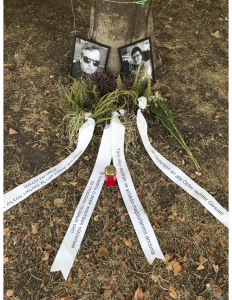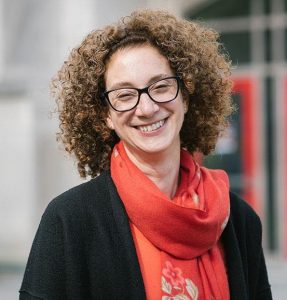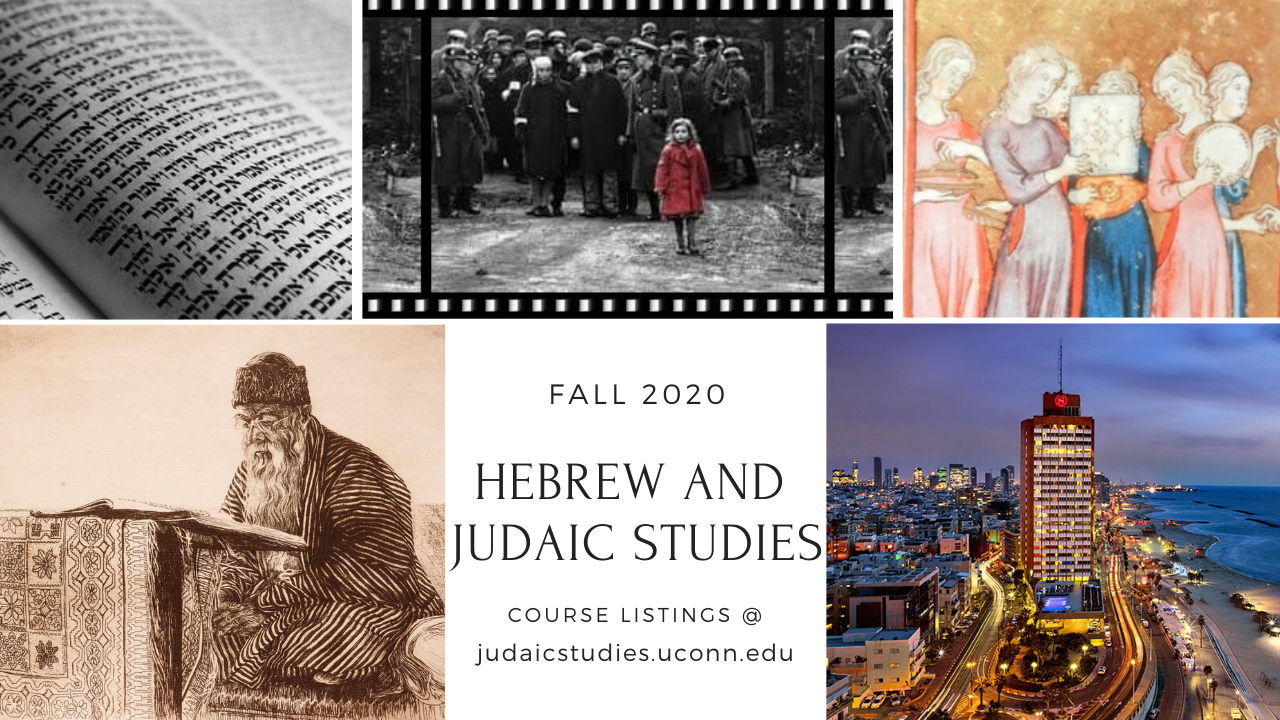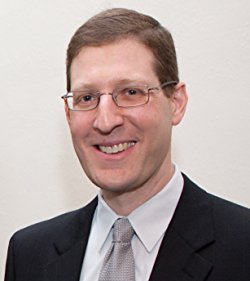
The solidarity banner pinned across the street from the court in Magdeburg reads:
“We remember the victims of the October 9, 2019, attack”
One Year After the Attack in Halle, Germany
On Yom Kippur 5780 / 2019 a neo-Nazi attempted to carry out the largest anti-Semitic mass murder in Germany after 1945. Now he is on trial. A visit in the courtroom.
The terrorist attack in Halle followed those of the National Socialist Underground (NSU) between 2000-07, and preceded that of Hanau on February 19, 2020. Ideologically and aesthetically the Halle attacker aligned himself with the white supremacist shootings in Utøya/Oslo 2011 and Christchurch 2019. On October 9, 2019, the 27 year-old attacker of Halle drove to the local synagogue, because he counted on the high-attendance of Yom Kippur. His plan was to throw explosives over the synagogue wall and to shoot the subsequently exiting congregants. When ineffective, he started shooting at the wooden door of the synagogue which, miraculously, did not give in. All of the 52 people davening inside survived, but when a 40 year-old passer-by confronted the shooter in front of the synagogue, he executed her. Her name was Jana L.
The attacker fled the scene by car and drove to the Turkish-owned Kebab diner, “Kiez Döner Bistro,” where he opened fire, killing the 20 year-old guest Kevin S. When fleeing again, he intentionally run over another passer-by, Abdi I., a Somali living in Germany, who was seriously injured.
Less known is the third crime scene, which was the subject of the court hearings on September 23. In Wiedersdorf, six miles East from Halle, the attacker attempted to hijack a new car for his escape. He entered the premises of Jens and Dagmar S. and demanded their car at gunpoint. One after the other, they refused to hand over the keys to him, upon which he shot Jens in the neck and Dagmar in the hip. Across the street he succeeded in obtaining a car from a car workshop, after threatening the three men present. The attacker was apprehended by police eventually, some 25 miles from Halle.
The trial is conducted by the Higher Regional Court Naumburg in Magdeburg, capital of Saxony-Anhalt, and opened on July 21. The attacker is charged with two counts of murder and 68 counts of attempted murder.
A group of some twenty visitors from Berlin happened to be at the Yom Kippur service, who came to pray with and support the small congregation of Halle. Among them were a number of U.S. American citizens, and the attack gained extensive media coverage also in the U.S. Head of the delegation were the two rabbis Rebecca Blady and Jeremy Borovitz who run Beit Hillel Berlin.
Wednesday, September 23, 2020, was the 15th day of the proceedings in Magdeburg. The courtroom and the building at large were heavily secured by police. Like everything else at the moment, the courtroom is also affected by Covid-19: plexi-dividers separating all the parties present, obligatory face masks, and social distancing is practiced as much as possible. Summoned to testify for that day were the five witnesses of the third crime scene. 44 media outlets, chosen by lot, were allowed a seat; with about 30 citizens the ranks of the audience was almost filled. To me as a legal layman, it was a surprise to see that the proceedings were largely comprehensible, and little time was spent on the back and forth of legal formalities.
Jens S. testified how a day like any other was interrupted by a stranger at his gate, demanding his car while pointing a pistol at him. He was shot in the neck when turning away from the intruder. He called for his spouse to stay inside the house, but she was already about to enter the courtyard. The scene repeated itself when Dagmar S., too, refused to hand over the keys and was shot subsequently. Jens’ voice dutifully detailed the events in question, but more so it spoke of the trauma he endured, the trauma of getting shot and of not being able to protect his loved-one. Dagmar described the perpetrator as a “wimp” and “mama’s boy,” which, I imagine, must have greatly insulted the attacker and his ideal of hyper-masculinity. Jens and Dagmar S. stated that their lives had not been the same since the attack.
The three men at the car workshop handed over the keys to a taxi immediately, and took cover inside the garage. After the attacker left, Kai H., the owner of the place, hastened to render first-aid to his neighbors. Daniel W. had the incredible presence of mind to remember that he had not yet turned off the taxi software in the car stolen. Thus he was able to track the car with his mobile phone. He then took the car of his brother - the third person present - to follow the attacker until he met police forces.
All five witnesses accused the police officers of acting unprofessionally and reluctantly, and of responding to the victims with disbelief and no empathy. The survivors from the synagogue voiced equally harsh criticism - the officers seemed to have had no idea of how to talk and attend to traumatized victims. The Halle police had not been aware of Yom Kippur, even though the local Jewish community had sent them their annual holiday calendar.
The neo-Nazi attacker spoke out twice during the proceedings. Acquaintances of his had previously described him as sophisticated and forbidding, and that largely matches my impressions. In his first statement, regarding the shooting of Jens and Dagmar, he asserted that he didn’t intend to shoot them, but that obtaining a new car was necessary for his escape. He explained his reasoning in a tone so matter-of-factly that it became apparent that shooting someone in the neck was the necessary means for his ends.
He also contested having ever turned his back on Jens and Dagmar, because “turning your back on the enemy means being incapacitated.” Media had reported that a certain scene of online war gaming was part of his radicalization. The way he expressed that logic made it seem psychologically as if he navigated his attack in a first-person shooter mode. He said that he did not intend to kill the two, but even that sentence sounded matter-of-factly and not remorseful. No explicit apology was offered.
Pictures from inside his car showed various para-military equipment: pistols, ammunition, rifles, hand grenades, a helmet, and a video-camera. In his second statement, he seemed happy to be granted the opportunity to speak as an expert on the technicalities of his weaponry, giving detailed accounts of their various functions.
When thinking about his statements it must be kept in mind how invested he was in the staging of his appearance from the start: he uploaded an announcement and a manifesto online, live-streamed the attack via an iPhone attached to his helmet, had created a playlist for the video, and spoke live to his virtual audience. We thus need to be sensitive to the attacker’s continuing interest in a certain public appearance. Nonetheless, I found myself perplexed that he didn’t utter a single word of ideology, or content, that is - it was all about technique and efficiency. (The reference is historically largely inadequate, but I did have to think of Hannah Arendt sitting in trial and not knowing what to make of Eichmann.)
The judge Ursula Mertens was impressive in her demeanor: She remained apolitical throughout, yet she showed sympathy with the sufferings of the witnesses beyond the professional protocol. She asked every single witness about how that trauma had impacted their lives, and how that experience still surfaces in their professional and everyday lives. Thus the victims were publicly acknowledged as aggrieved human beings beyond the legal aspect.
Signs of solidarity came from other parties as well: The Jewish Congregation of Halle sent a voucher for a weekend hotel stay to Jens and Dagmar S. Anti-fascist groups are jointly putting up a booth across the court on every day of the trial to inform the public, serve tea and cookies, and to remember the victims publicly. More importantly, they are monitoring and logging the entire lawsuit.
Here is my personal take-away of that visit:
- Lawsuits are generally public and it is worth going. The restoration of justice needs the public. It is an important signal to the aggrieved party to see that the public is taking an interest. Plus, one learns so much even in a one-day visit.
- A court room can affect society far beyond the legal realm: If the judge in their tone, timing, and compassion allows for it, the harm and the pain of the aggrieved becomes acknowledged. A person who fell victim to a crime can choose to enter the stage as a plaintiff, which is empowering. It can also be the place of different parties forming an alliance of solidarity.
- Fatality is the hard currency of public memory. We try to remember people who were killed and to listen to the bereaved. That day I realized that I wasn’t aware enough of the people who were injured physically or psychologically, about their scars and traumas. I hadn’t even heard about the third crime scene because of that, and I hope we as a society will do better in the future.
Survivors of the attack aired a [joint statement] in July which urges media coverage to deny the attacker his desired attention by not mentioning his name. I wish to respect that in this article.
To read more: Rabbi Jeremy Borovitz gave an account of the happenings inside the synagogue shortly after the attack to the [Forward]. Please read [in this interview] what it means for Rabbi Rebecca Blady to be the granddaughter of Shoah survivors and a plaintiff in the Halle trial. The blog [Prozess Report Halle] provides you with extended reports, documents, and testimonies from the trial, also in English. Radio Corax is producing [20-minutes summaries] of each day of the trial in German. [This short video] by Deutsche Welle captures the feeling of two Jews in Berlin one year after the attack.

Also across the streets: Pictures of the two people murdered, flowers, a wreath, and a candle.
In German, Turkish, Russian, and Hebrew, it reads “In memoriam of all the victims of right-wing violence”




 March 12, 2020
March 12, 2020